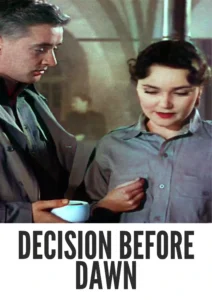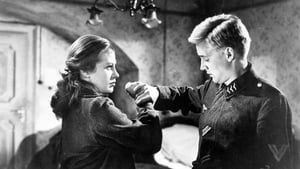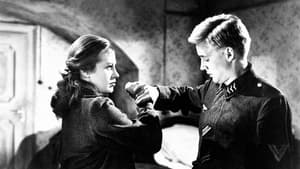Contact: info@alwanfilm.com
Video Sources 0 Views
- Watch trailer
- Decision Before Dawn


Synopsis
Table of Contents
ToggleReview: Decision Before Dawn 1951 Colorized – A Riveting Tale of Loyalty, Sacrifice, and Moral Dilemmas

Introduction
Decision Before Dawn, released in 1951, stands as a gripping war drama directed by Anatole Litvak. Set against the backdrop of World War II, this film follows the harrowing journey of a German-American spy tasked with infiltrating Nazi-occupied territory. In this review, we’ll delve into the compelling narrative of Decision Before Dawn and its exploration of loyalty, sacrifice, and the complexities of wartime morality.
Check The Full Colorized Movies List
Check Our Colorized Movies Trailer Channel
Understanding Decision Before Dawn 1951 Colorized: Director, Cast, and Genre
Directed by Anatole Litvak, Decision Before Dawn boasts a talented ensemble cast led by Richard Basehart, Oskar Werner, and Gary Merrill. The film falls within the war drama genre, known for its exploration of the human experience amidst the chaos of conflict.
Exploring the World of Decision Before Dawn 1951 Colorized: Plot and Characters
Decision Before Dawn tells the story of Lieutenant Rennick (Richard Basehart), an American intelligence officer who recruits German prisoners of war to gather crucial information behind enemy lines. Among these volunteers is Karl Maurer (Oskar Werner), a German soldier torn between loyalty to his country and his growing disillusionment with the Nazi regime. As Maurer embarks on his dangerous mission, he must navigate moral dilemmas and confront the harsh realities of war.
The Art of Film Colorization
While Decision Before Dawn was originally filmed in black and white, its early colorized version adds a new layer of visual depth and intensity to its wartime narrative. The colorization process enhances the film’s atmospheric cinematography and captures the visceral impact of battle, immersing viewers in the chaos and uncertainty of wartime Europe with authenticity and nuance.
Early Colored Films: A Brief History
The history of early colored films is marked by innovation and experimentation as filmmakers sought to enhance the visual appeal of their movies. From hand-tinted frames to groundbreaking technicolor processes, the evolution of colorization techniques transformed the cinematic landscape, offering audiences a new way to experience the drama and spectacle of war.
Decision Before Dawn (1951) and Its Early Colored Version
The decision to release Decision Before Dawn in a colorized format was made with the intention of immersing audiences in the visceral reality of wartime Europe and enhancing the film’s visual impact. While some purists may prefer the original black and white version, the early colorized edition of the film adds a new layer of intensity to its storytelling and captures the emotional toll of war with authenticity and nuance.
The Debate Over Film Colorization
The debate over film colorization continues to divide audiences and industry professionals alike. While some argue that colorization enhances the visual appeal of classic films and makes them more accessible to modern audiences, others maintain that it compromises the artistic integrity of the original work. As technology advances and filmmaking techniques evolve, the debate over colorization remains a topic of ongoing discussion within the film community.
Examining Decision Before Dawn (1951) as an Early Colored Film
Viewing Decision Before Dawn in its early colorized iteration offers audiences a fresh perspective on its gripping narrative and timeless themes. The colorization process enhances the film’s emotional impact and brings to life the chaos and uncertainty of wartime Europe, immersing viewers in the moral complexities of espionage and the human cost of conflict. As Karl Maurer grapples with his conscience and confronts the horrors of war, his journey serves as a poignant reminder of the sacrifices made in the pursuit of freedom and justice.
Influence and Legacy: Decision Before Dawn 1951 Colorized’s Impact on Cinema
Decision Before Dawn is widely regarded as a riveting war drama that offers a stark portrayal of the human experience amidst the chaos of conflict. Its exploration of loyalty, sacrifice, and moral dilemmas has inspired audiences around the world and influenced the depiction of wartime espionage in popular culture. As a testament to its enduring relevance, Decision Before Dawn remains a powerful and thought-provoking cinematic experience that continues to resonate with audiences of all ages.
Director’s Cinematic Legacy: Beyond Decision Before Dawn 1951 Colorized
Anatole Litvak’s directorial legacy extends far beyond Decision Before Dawn, encompassing a diverse body of work that explores themes of courage, resilience, and the human spirit. As a filmmaker, Litvak was known for his ability to tell compelling stories with depth and authenticity, as evidenced by his masterful direction of Decision Before Dawn. The film stands as a testament to his talent and creativity, solidifying his reputation as one of the great directors of his time.
Themes Explored in Decision Before Dawn 1951 Colorized
At its core, Decision Before Dawn explores themes of loyalty, sacrifice, and the complexities of wartime morality. Through its gripping narrative and morally ambiguous characters, the film delves into the human cost of espionage and the sacrifices made in the pursuit of freedom and justice. As Karl Maurer grapples with his conscience and confronts the horrors of war, his journey serves as a powerful reminder of the moral complexities inherent in the fight for liberty.
Reception and Controversy Surrounding Decision Before Dawn 1951 Colorized
Upon its release, Decision Before Dawn received widespread critical acclaim for its gripping narrative, atmospheric cinematography, and powerhouse performances. However, the decision to release the film in a colorized format sparked debate among fans and critics alike. While some praised the colorization process for enhancing the film’s visual impact, others questioned its necessity and expressed concern about preserving the integrity of Litvak’s original vision.
Where to Watch Decision Before Dawn 1951 Colorized Online
For those eager to experience Decision Before Dawn for themselves, the film is readily available on popular streaming platforms such as Amazon Prime Video, Google Play Movies, and iTunes. Whether viewed in its original black and white format or its early colorized iteration, Decision Before Dawn offers a riveting and thought-provoking cinematic experience that is sure to leave a lasting impression.
FAQs About Decision Before Dawn 1951 Colorized
1. Is Decision Before Dawn based on a true story?
No, Decision Before Dawn is a fictionalized portrayal of wartime espionage and the human cost of conflict. While the film’s characters and storyline are works of fiction, its exploration of loyalty, sacrifice, and moral dilemmas draws inspiration from real-life events and historical settings.
2. Who starred in Decision Before Dawn?
Decision Before Dawn stars Richard Basehart as Lieutenant Rennick, an American intelligence officer tasked with recruiting German prisoners of war for espionage missions, and Oskar Werner as Karl Maurer, a German soldier torn between loyalty to his country and his growing disillusionment with the Nazi regime. Their compelling performances bring depth and authenticity to their respective roles, elevating the emotional resonance of the film and capturing the moral complexities of wartime espionage.
3. What is the central conflict of Decision Before Dawn?
At its core, Decision Before Dawn revolves around the central conflict of loyalty versus duty in the midst of war. As Karl Maurer grapples with his conscience and confronts the horrors of Nazi occupation, he must navigate moral dilemmas and make difficult choices that will ultimately determine the fate of his country and his own sense of honor.
4. Why was Decision Before Dawn released in a colorized format?
The decision to release Decision Before Dawn in a colorized format was made with the intention of immersing audiences in the visceral reality of wartime Europe and enhancing the film’s visual impact. While some purists may prefer the original black and white version, the early colorized edition of the film adds a new layer of intensity to its storytelling and captures the emotional toll of war with authenticity and nuance.
5. What is the legacy of Decision Before Dawn?
Decision Before Dawn is widely regarded as a riveting war drama that offers a stark portrayal of the human experience amidst the chaos of conflict. Its exploration of loyalty, sacrifice, and moral dilemmas has inspired audiences around the world and influenced the depiction of wartime espionage in popular culture.
6. Are there any sequels or remakes of Decision Before Dawn?
No, there are no direct sequels or remakes of Decision Before Dawn. However, the film’s enduring legacy and timeless themes have left an indelible mark on the portrayal of wartime espionage in cinema, inspiring countless imitators and influencing the way wartime morality is depicted onscreen.
7. Where can I watch Decision Before Dawn online?
For those eager to experience Decision Before Dawn for themselves, the film is readily available on popular streaming platforms such as Amazon Prime Video, Google Play Movies, and iTunes. Whether viewed in its original black and white format or its early colorized iteration, Decision Before Dawn offers a riveting and thought-provoking cinematic experience that is sure to leave a lasting impression.
Conclusion
In conclusion, Decision Before Dawn remains a riveting war drama that offers a stark portrayal of loyalty, sacrifice, and the complexities of wartime morality. Whether viewed in its original black and white format or its early colorized iteration, Anatole Litvak’s classic film offers a gripping and thought-provoking cinematic experience that continues to resonate with audiences of all ages. As viewers immerse themselves in the harrowing journey of Karl Maurer and his fellow spies, they are reminded of the human cost of conflict and the enduring power of courage and sacrifice in the face of adversity, making Decision Before Dawn a timeless cinematic gem that is sure to stand the test of time.













